a side blog of pure art/writing refrences i need and where I occasionally post my drawings. I might also reblog some drawing tutorials. If ya'll really want to see my shitty art I got a deviantart and an Instagram under the same name Marina Ursa
Don't wanna be here? Send us removal request.
Photo
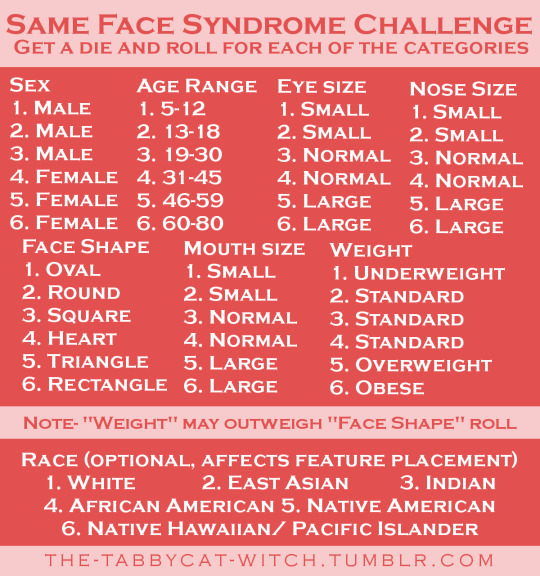
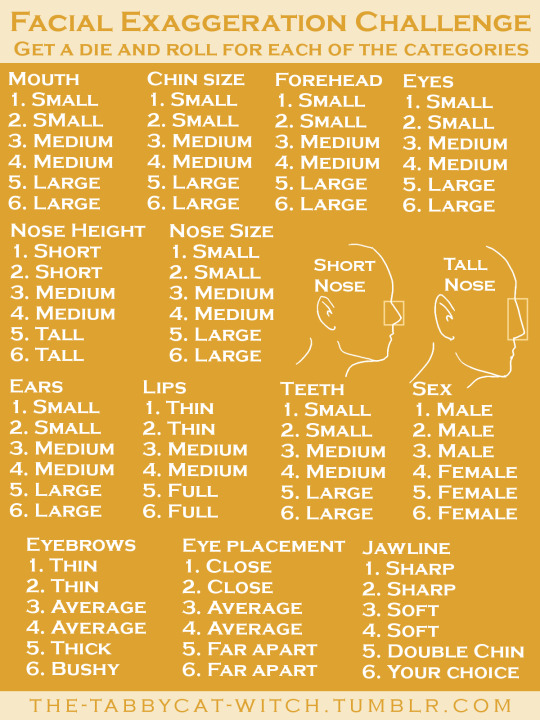
Hey, guys! I’ve noticed that there are a lot of artists who struggle with “same face syndrome,” or the tendency to draw all their characters with the same face. To help you combat this, I’ve created two different challenges!
The first (pink) one is mainly geared towards artists who are struggling with same face syndrome and want to start branching out. It covers topics that a lot of artists struggle with when drawing faces, such as age, weight, and face shapes. It’s not super specific, so you still have some wiggle room.
The second (yellow) one is a bit harder and is mainly geared towards artists who want to really challenge themselves to diversify their faces. Personally, I think this one’s the most fun to work with despite it being more difficult. Chances are with this one, you’re not going to be drawing a whole bunch of beautiful people. You don’t have to roll for every option on this one either. A certain combination of rolls from 10/13 of the options may give you a great character idea, and that’s great!
I hope you guys enjoy these! I’d love for you to send me your drawings if you do one (or both) of them.
22K notes
·
View notes
Text
Resources For Writing Sketchy Topics
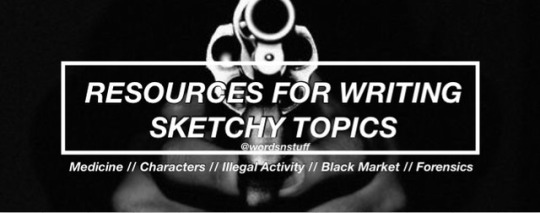
Medicine
A Study In Physical Injury
Comas
Medical Facts And Tips For Your Writing Needs
Broken Bones
Burns
Unconsciousness & Head Trauma
Blood Loss
Stab Wounds
Pain & Shock
All About Mechanical Injuries (Injuries Caused By Violence)
Writing Specific Characters
Portraying a kleptomaniac.
Playing a character with cancer.
How to portray a power driven character.
Playing the manipulative character.
Portraying a character with borderline personality disorder.
Playing a character with Orthorexia Nervosa.
Writing a character who lost someone important.
Playing the bullies.
Portraying the drug dealer.
Playing a rebellious character.
How to portray a sociopath.
How to write characters with PTSD.
Playing characters with memory loss.
Playing a pyromaniac.
How to write a mute character.
How to write a character with an OCD.
How to play a stoner.
Playing a character with an eating disorder.
Portraying a character who is anti-social.
Portraying a character who is depressed.
How to portray someone with dyslexia.
How to portray a character with bipolar disorder.
Portraying a character with severe depression.
How to play a serial killer.
Writing insane characters.
Playing a character under the influence of marijuana.
Tips on writing a drug addict.
How to write a character with HPD.
Writing a character with Nymphomania.
Writing a character with schizophrenia.
Writing a character with Dissociative Identity Disorder.
Writing a character with depression.
Writing a character who suffers from night terrors.
Writing a character with paranoid personality disorder.
How to play a victim of rape.
How to play a mentally ill/insane character.
Writing a character who self-harms.
Writing a character who is high on amphetamines.
How to play the stalker.
How to portray a character high on cocaine.
Playing a character with ADHD.
How to play a sexual assault victim.
Writing a compulsive gambler.
Playing a character who is faking a disorder.
Playing a prisoner.
Portraying an emotionally detached character.
How to play a character with social anxiety.
Portraying a character who is high.
Portraying characters who have secrets.
Portraying a recovering alcoholic.
Portraying a sex addict.
How to play someone creepy.
Portraying sexually/emotionally abused characters.
Playing a character under the influence of drugs.
Playing a character who struggles with Bulimia.
Illegal Activity
Examining Mob Mentality
How Street Gangs Work
Domestic Abuse
Torture
Assault
Murder
Terrorism
Internet Fraud
Cyberwarfare
Computer Viruses
Corporate Crime
Political Corruption
Drug Trafficking
Human Trafficking
Sex Trafficking
Illegal Immigration
Contemporary Slavery
Black Market Prices & Profits
AK-47 prices on the black market
Bribes
Computer Hackers and Online Fraud
Contract Killing
Exotic Animals
Fake Diplomas
Fake ID Cards, Passports and Other Identity Documents
Human Smuggling Fees
Human Traffickers Prices
Kidney and Organ Trafficking Prices
Prostitution Prices
Cocaine Prices
Ecstasy Pills Prices
Heroin Prices
Marijuana Prices
Meth Prices
Earnings From Illegal Jobs
Countries In Order Of Largest To Smallest Risk
Forensics
arson
Asphyxia
Blood Analysis
Book Review
Cause & Manner of Death
Chemistry/Physics
Computers/Cell Phones/Electronics
Cool & Odd-Mostly Odd
Corpse Identification
Corpse Location
Crime and Science Radio
crime lab
Crime Scene
Cults and Religions
DNA
Document Examination
Fingerprints/Patterned Evidence
Firearms Analysis
Forensic Anthropology
Forensic Art
Forensic Dentistry
Forensic History
Forensic Psychiatry
General Forensics
Guest Blogger
High Tech Forensics
Interesting Cases
Interesting Places
Interviews
Medical History
Medical Issues
Misc
Multiple Murderers
On This Day
Poisons & Drugs
Police Procedure
Q&A
serial killers
Space Program
Stupid Criminals
Theft
Time of Death
Toxicology
Trauma
295K notes
·
View notes
Photo

A little info about the basic background from the 5th edition PHB!
15K notes
·
View notes
Photo









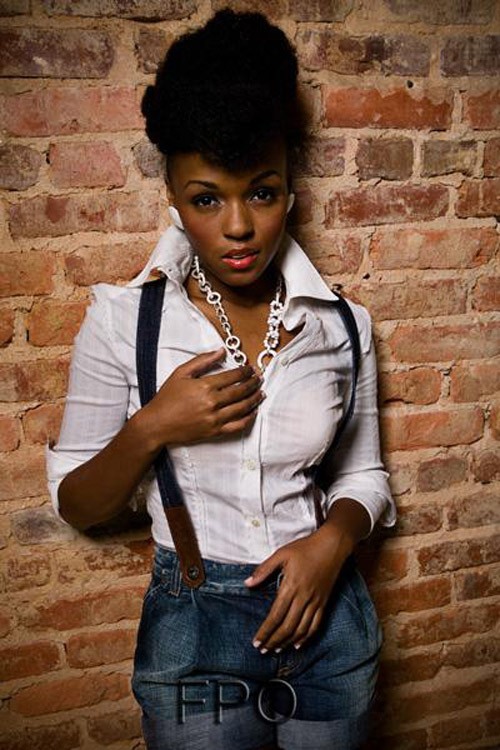




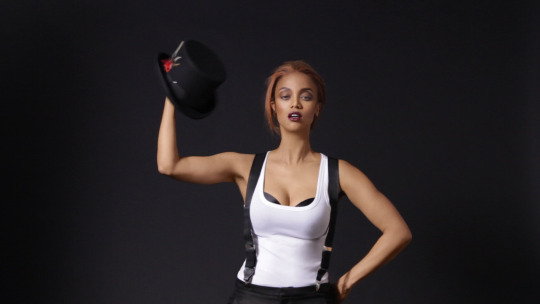



Ladies in Suspenders
For @red-streaks, HAPPY BIRTHDAY MARI!!!!!!!! Please don’t hate me for this.
79K notes
·
View notes
Text
HEY ARTISTS!
Do you design a lot of characters living in not-modern eras and you’re tired of combing through google for the perfect outfit references? Well I got good news for you kiddo, this website has you covered! Originally @modmad made a post about it, but her link stopped working and I managed to fix it, so here’s a new post. Basically, this is a costume rental website for plays and stage shows and what not, they have outfits for several different decades from medieval to the 1980s. LOOK AT THIS SELECTION:
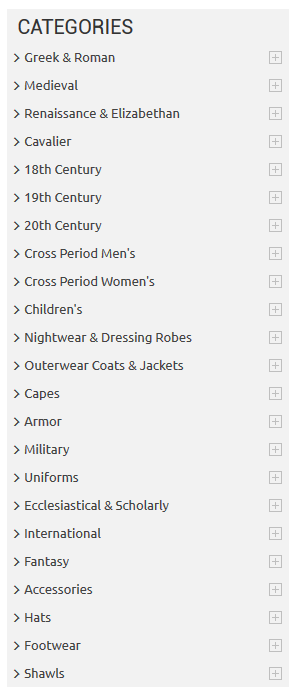
OPEN ANY CATEGORY AND OH LORDY–
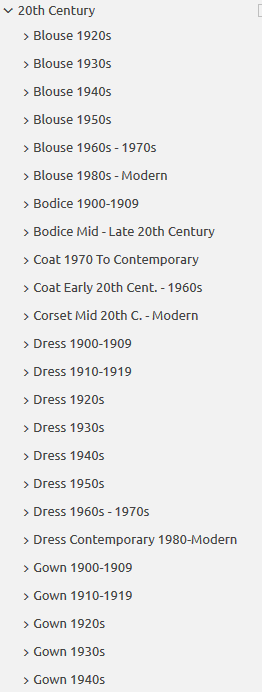
There’s a lot of really specific stuff in here, I design a lot of 1930s characters for my ask blog and with more chapters on the way for the game it belongs to I’m gonna be designing more, and this website is going to be an invaluable reference. I hope this can be useful to my other fellow artists as well! :)
298K notes
·
View notes
Note
do you have any tips for learning to stylise animals? I have a habit of drawing them too realistically, and want to learn to style them more simple & effectively. Yours are awesome so I thought I'd ask the best :')
I took half an hour aside to hopefully make something which might help you (or might confuse you further) .
Alright, so you need to start thinking of animals as shapes, and not so much as animals. Here’s a bog-standard but ugly as ass pony for you.

You need to start seeing this pony as this. Mr Pons is showing his main shapes. His head is circles and connecting lines. Every part of him needs to be some sort of polygon which you can envision with your head.

All of those shapes can be pulled or pushed to make something new. I took our ugly ass Mr Pons and made him into some hunky warrior horse. So you’re wondering, what the hell Velle, how the heck did you get him there. Well, his shapes are still the same.

I just made them larger and pulled those lines out. Every straight line that connects the dots can be bent, every shape can be pulled, misshapen or distorted. You can also squash elements. As you can see, I moved his legs up, I gave him shorter limbs. Shorter and stockier can mean stronger which is what I was aiming for.

Alternatively we could pinch those lines in and make a pretty weak looking animal. I mean look, he has basically no ass. This is kind of where your foundations in anatomy start to play a major role, even though I pinched this animal a lot you can still look at it and think “That’s a horse.” His neck is still long, his withers are still prominent, it still holds himself with a good posture.

Anyway, moving on… I find the best way to get a good but unique sort of characterisation of a animal is to pull, push, bend and pinch. I will distort each part. This horse is a combination of strong characteristics, and weaker characteristics. He is pretty balanced, but he ended up as strong horse who might have some speed which his light limbs. I want a fellow like this one to pull me in a carriage as I drink Champagne or some fizz or something.

Another good way to characterise an animal is to exaggerate areas which stands out to you. So this is a quick sketch of my cat Winnie who is currently asleep next to me. She’s a pretty standard looking cat to most people.

Working on that image I made something which is more of a play on how I like to describe her to other people. When I describe her to other people I usually revert to, “She has large ears, chunky cheeks, kind of skinny with a saggy belly, long black tail and teeny white toes.” There we go, we have our aim. If look at that description and look at the image below you can see where I forced out those characteristics.

I quickly slopped some colours in for you guys because my cat is adorable ok.

Also being cruel to their image can make you draw a really good representation of them. Here’s my brothers pug bitch Frankie. As you can see, I was not kind at all in drawing her. I made her wall eye really obvious, squished her face since pugs are just a big squish, chunked her neck out since she has a shit tonne of skin there and gave her these long ass legs. Seriously, this dog has the longest legs I’ve ever seen on a pug. However taking how mean I was, it works in a representation of her. She is a just a big happy wrinkle with a lot of quirks.

Anyway, I hope this is helpful, if at all. It’s not an easy process to explain and I glossed over it, but yeah… Enjoy!
2K notes
·
View notes
Text
Tfw your OC drawings do better than your inktober drawings
#im confused#should i be glad peoole are interested in my oc's or slightly pissed off that my anime like drawing are better recieved?#was it the tags?#the time?#either way im glad#:D#tumblr is seriously such a shitty place to post your artwork.#thank god i moved
1 note
·
View note
Text
My Ultimate 40 Question Character Sheet
Disclaimer: I made this up by looking over a few different sheets and taking the questions I felt I most needed to answer. I decided to share because it really helped me out. This in no way came from my own brain.
Describe your character in a few words.
What do you know about your character that they don’t know yet?
What are your character’s major flaws?
What would your character give their life for?
What is your character’s greatest asset?
What would completely break your character?
How does the image your character tries to project differ from the image they actually project?
What is your character afraid of?
Where would your character fall on a politeness/rudeness scale?
If your character could choose a different identity, who would they pick?
In what or whom is your character’s greatest faith in?
What was the best thing in your character’s life?
What was the worst thing in your character’s life?
What is your character’s biggest nightmare?
What seemingly insignificant memories stuck with your character?
What is your character’s secret wish?
What is your character’s greatest achievement?
What is your character’s deepest regret?
What is your character’s deepest disappointment?
What is your character reluctant to tell people?
What is your character hiding from themselves?
What makes this character angry? What calms them?
List situations in which your character would not have control over themselves.
How strong is your character’s emotions? Controllable? Uncontrollable?
What wakes your character up in the middle of the night?
Describe a recurring dream and/or nightmare.
Describe your character’s family.
Name your character’s favourite person and why.
How many friends does your character have?
How many friends does your character want?
How would a friend or close relative describe your character?
Who depends on your character? Why?
Who does your character most want to please? Why?
How does your character feel about sex?
How does your character feel about romantic relationships?
If your character had to live in utter seclusion, what six items would they bring?
What is your character’s most noticeable trait and most noticeable physical feature?
How does your character feel about work?
Write one headcanon.
Write one additional thing about your character.
2K notes
·
View notes
Link
amandaonwriting:
Character Flaws
Absent-minded - Preoccupied to the extent of being unaware of one’s immediate surroundings. Abstracted, daydreaming, inattentive, oblivious, forgetful.
Abusive - Characterized by improper infliction of physical or psychological maltreatment towards another.
Addict - One who is addicted to a compulsive activity. Examples: gambling, drugs, sex.
Aimless - Devoid of direction or purpose.
Alcoholic - A person who drinks alcoholic substances habitually and to excess.
Anxious - Full of mental distress or uneasiness because of fear of danger or misfortune; greatly worried; solicitous.
Arrogant - Having or displaying a sense of overbearing self-worth or self-importance. Inclined to social exclusiveness and who rebuff the advances of people considered inferior. Snobbish.
Audacious - Recklessly bold in defiance of convention, propriety, law, or the like; insolent; braze, disobedient.
Bad Habit - A revolting personal habit. Examples: picks nose, spits tobacco, drools, bad body odour.
Bigmouth - A loud-mouthed or gossipy person.
Bigot - One who is strongly partial to one’s own group, religion, race, or politics and is intolerant of those who differ.
Blunt - Characterized by directness in manner or speech; without subtlety or evasion. Frank, callous, insensitive, brusque.
Bold - In a bad sense, too forward; taking undue liberties; over assuming or confident; lacking proper modesty or restraint; rude; impudent. Abrupt, brazen, cheeky, brassy, audacious.
Callous - They are hardened to emotions, rarely showing any form of it in expression. Unfeeling. Cold.
Childish - Marked by or indicating a lack of maturity; puerile.
Complex - An exaggerated or obsessive concern or fear. (List specific complex.)
Cruel - Mean to anyone or anything, without care or regard to consequences and feelings.
Cursed - A person who has befallen a prayer for evil or misfortune, placed under a spell, or borne into an evil circumstance, and suffers for it. Damned.
Dependent - Unable to exist, sustain oneself, or act appropriately or normally without the assistance or direction of another.
Deranged - Mentally decayed. Insane. Crazy. Mad. Psychotic.
Dishonest – Given to or using fraud, cheating; deceitful, deceptive, crooked, underhanded.
Disloyal - Lacking loyalty. Unfaithful, perfidious, traitorous, treasonable
Disorder - An ailment that affects the function of mind or body. (List the disorders name if they have one.) See the Mental Disorder List.
Disturbed - Showing some or a few signs or symptoms of mental or emotional illness. Confused, disordered, neurotic, troubled.
Dubious - Fraught with uncertainty or doubt. Undecided, doubtful, unsure.
Dyslexic - Affected by dyslexia, a learning disorder marked by impairment of the ability to recognize and comprehend written words.
Egotistical - Characteristic of those having an inflated idea of their own importance. Boastful, pompous.
Envious - Showing extreme cupidity; painfully desirous of another’s advantages; covetous, jealous.
Erratic - Deviating from the customary course in conduct or opinion; eccentric: erratic behaviour. Eccentric, bizarre, outlandish, strange.
Fanatical - Fanatic outlook or behaviour especially as exhibited by excessive enthusiasm, unreasoning zeal, or wild and extravagant notions on some subject.
Fickle – Erratic, changeable, unstable - especially with regard to affections or attachments; capricious.
Fierce - Marked by extreme intensity of emotions or convictions; inclined to react violently; fervid.
Finicky - Excessively particular or fastidious; difficult to please; fussy. Too much concerned with detail. Meticulous, fastidious, choosy, critical, picky, prissy, pernickety.
Fixated - In psychoanalytic theory, a strong attachment to a person or thing, especially such an attachment formed in childhood or infancy and manifested in immature or neurotic behaviour that persists throughout life. Fetish, quirk, obsession, infatuation.
Flirt -To make playfully romantic or sexual overtures; behaviour intended to arouse sexual interest. Minx. Tease.
Gluttonous - Given to excess in consumption of especially food or drink. Voracious, ravenous, wolfish, piggish, insatiable.
Gruff - Brusque or stern in manner or appearance. Crusty, rough, surly.
Gullible - Will believe any information given, regardless of how valid or truthful it is, easily deceived or duped.
Hard - A person who is difficult to deal with, manage, control, overcome, or understand. Hard emotions, hard hearted.
Hedonistic - Pursuit of or devotion to pleasure, especially to the pleasures of the senses.
Hoity-toity- Given to flights of fancy; capricious; frivolous. Prone to giddy behaviour, flighty.
Humourless - The inability to find humour in things, and most certainly in themselves.
Hypocritical - One who is always contradicting their own beliefs, actions or sayings. A person who professes beliefs and opinions for others that he does not hold. Being a hypocrite.
Idealist - One whose conduct is influenced by ideals that often conflict with practical considerations. One who is unrealistic and impractical, guided more by ideals than by practical considerations.
Idiotic - Marked by a lack of intelligence or care; foolish or careless.
Ignorant - Lacking knowledge or information as to a particular subject or fact. Showing or arising from a lack of education or knowledge.
Illiterate - Unable to read and write.
Immature - Emotionally undeveloped; juvenile; childish.
Impatient - Unable to wait patiently or tolerate delay; restless. Unable to endure irritation or opposition; intolerant.
Impious - Lacking piety and reverence for a god/gods and their followers.
Impish - Naughtily or annoyingly playful.
Incompetent - Unable to execute tasks, no matter how the size or difficulty.
Indecisive - Characterized by lack of decision and firmness, especially under pressure.
Indifferent - The trait of lacking enthusiasm for or interest in things generally, remaining calm and seeming not to care; a casual lack of concern. Having or showing little or no interest in anything; languid; spiritless.
Infamy - Having an extremely bad reputation, public reproach, or strong condemnation as the result of a shameful, criminal, or outrageous act that affects how others view them.
Intolerant - Unwilling to tolerate difference of opinion and narrow-minded about cherished opinions.
Judgemental - Inclined to make and form judgements, especially moral or personal ones, based on one’s own opinions or impressions towards others/practices/groups/religions based on appearance, reputation, occupation, etc.
Klutz - Clumsy. Blunderer.
Lazy - Resistant to work or exertion; disposed to idleness.
Lewd - Inclined to, characterized by, or inciting to lust or lechery; lascivious. Obscene or indecent, as language or songs; salacious.
Liar - Compulsively and purposefully tells false truths more often than not. A person who has lied or who lies repeatedly.
Lustful - Driven by lust; preoccupied with or exhibiting lustful desires.
Masochist - The deriving of sexual gratification, or the tendency to derive sexual gratification, from being physically or emotionally abused. A willingness or tendency to subject oneself to unpleasant or trying experiences.
Meddlesome - Intrusive in a meddling or offensive manner, given to meddling; interfering.
Meek - Evidencing little spirit or courage; overly submissive or compliant; humble in spirit or manner; suggesting retiring mildness or even cowed submissiveness.
Megalomaniac - A psycho pathological condition characterized by delusional fantasies of wealth, power, or omnipotence.
Naïve - Lacking worldly experience and understanding, simple and guileless; showing or characterized by a lack of sophistication and critical judgement.
Nervous - Easily agitated or distressed; high-strung or jumpy.
Non-violent - Abstaining from the use of violence.
Nosey - Given to prying into the affairs of others; snoopy. Offensively curious or inquisitive.
Obsessive - An unhealthy and compulsive preoccupation with something or someone.
Oppressor - A person of authority who subjects others to undue pressures, to keep down by severe and unjust use of force or authority.
Overambitious - Having a strong excessive desire for success or achievement.
Overconfident - Excessively confident; presumptuous.
Overemotional - Excessively or abnormally emotional. Sensitive about themselves and others, more so than the average person.
Overprotective - To protect too much; coddle.
Overzealous - Marked by excessive enthusiasm for and intense devotion to a cause or idea.
Pacifist - Opposition to war or violence as a means of resolving disputes. (Can double as a merit in certain cases)
Paranoid - Exhibiting or characterized by extreme and irrational fear or distrust of others.
Peevish - Expressing fretfulness and discontent, or unjustifiable dissatisfaction. Cantankerous, cross, ill-tempered, testy, captious, discontented, crotchety, cranky, ornery.
Perfectionist - A propensity for being displeased with anything that is not perfect or does not meet extremely high standards.
Pessimist - A tendency to stress the negative or unfavourable or to take the gloomiest possible view.
Pest - One that pesters or annoys, with or without realizing it. Nuisance. Annoying. Nag.
Phobic – They have a severe form of fear when it comes to this one thing. Examples: Dark, Spiders, Cats
Practical - Level-headed, efficient, and unspeculative. No-nonsense.
Predictable - Easily seen through and assessable, where almost anyone can predict reactions and actions of said person by having met or known them even for a short time.
Proud - Filled with or showing excessive self-esteem and will often shirk help from others for the sake of pride.
Rebellious - Defying or resisting some established authority, government, or tradition; insubordinate; inclined to rebel.
Reckless - Heedless. Headstrong. Foolhardy. Unthinking boldness, wild carelessness and disregard for consequences.
Remorseless - Without remorse; merciless; pitiless; relentless.
Rigorous - Rigidly accurate; allowing no deviation from a standard; demanding strict attention to rules and procedures.
Sadist - The deriving of sexual gratification or the tendency to derive sexual gratification from inflicting pain or emotional abuse on others. Deriving of pleasure, or the tendency to derive pleasure, from cruelty.
Sadomasochist - Both sadist and masochist combined.
Sarcastic - A subtle form of mockery in which an intended meaning is conveyed obliquely.
Sceptic - One who instinctively or habitually doubts, questions, or disagrees with assertions or generally accepted conclusions.
Seducer - To lead others astray, as from duty, rectitude, or the like; corrupt. To attempt to lead or draw someone away, as from principles, faith, or allegiance.
Selfish - Concerned chiefly or only with oneself.
Self-Martyr - One who purposely makes a great show of suffering in order to arouse sympathy from others, as a form of manipulation, and always for a selfish cause or reason.
Self-righteous - Piously sure of one’s own righteousness; moralistic. Exhibiting pious self-assurance. Holier-than-thou, sanctimonious.
Senile - Showing a decline or deterioration of physical strength or mental functioning, esp. short-term memory and alertness, as a result of old age or disease.
Shallow - Lacking depth of intellect or knowledge; concerned only with what is obvious.
Smart Ass - Thinks they know it all, and in some ways they may, but they can be greatly annoying and difficult to deal with at times, especially in arguments.
Soft-hearted - Having softness or tenderness of heart that can lead them into trouble; susceptible of pity or other kindly affection. They cannot resist helping someone they see in trouble, suffering or in need, and often don’t think of the repercussions or situation before doing so.
Solemn - Deeply earnest, serious, and sober.
Spineless - Lacking courage. Cowardly, wimp, lily-livered, gutless.
Spiteful - Showing malicious ill will and a desire to hurt; motivated by spite; vindictive person who will look for occasions for resentment. Vengeful.
Spoiled - Treated with excessive indulgence and pampering from earliest childhood, and has no notion of hard work, self-care or money management; coddled, pampered. Having the character or disposition harmed by pampering or over-solicitous attention.
Squeamish - Excessively fastidious and easily disgusted.
Stubborn - Unreasonably, often perversely unyielding; bull-headed. Firmly resolved or determined; resolute.
Superstitious - An irrational belief arising from ignorance or fear from an irrational belief that an object, action, or circumstance not logically related to a course of events influences its outcome.
Tactless - Lacking or showing a lack of what is fitting and considerate in dealing with others.
Temperamental - Moody, irritable, or sensitive. Excitable, volatile, emotional.
Theatrical - Having a flair for over dramatizing situations, doing things in a ‘big way’ and love to be ‘centre stage’.
Timid -Tends to be shy and/or quiet, shrinking away from offering opinions or from strangers and newcomers, fearing confrontations and violence.
Tongue-tied - Speechless or confused in expression, as from shyness, embarrassment, or astonishment.
Troublemaker - Someone who deliberately stirs up trouble, intentionally or unintentionally.
Unlucky - Marked by or causing misfortune; ill-fated. Destined for misfortune; doomed.
Unpredictable - Difficult to foretell or foresee, their actions are so chaotic it’s impossible to know what they are going to do next.
Untrustworthy - Not worthy of trust or belief. Backstabber.
Vain - Holding or characterized by an unduly high opinion of their physical appearance. Lovers of themselves. Conceited, egotistic, narcissistic.
Weak-willed - Lacking willpower, strength of will to carry out one’s decisions, wishes, or plans. Easily swayed.
Withdrawn - Not friendly or Sociable. Aloof.
Zealous - A fanatic.
From The Character Therapist
145K notes
·
View notes
Text
How to make a character's death sadder
Don’t have them die of old age after a long, fulfilling life. Many people don’t even think of this as sad (note that this can still work if you have enough of the other factors).
Leave one of their major goals unfinished. The more enthusiastic they are about completing the goal, the sadder.
Give them strong relationships with other characters.
Make them fight against whatever is causing their death. Their ultimate loss is sadder if they struggle.
Kill them in the middle of their character arc.
Don’t describe their funeral in detail. Maybe it’s just me, but I find that long descriptions of funerals kill the sadness.
445K notes
·
View notes
Photo

This is an ultimate masterlist of many resources that could be helpful for writers. I apologize in advance for any not working links. Check out the ultimate writing resource masterlist here (x) and my “novel” tag here (x).
✑ PLANNING
Outlining & Organizing
For the Architects: The Planning Process
Rough Drafts
How do you plan a novel?
Plot Development: Climax, Resolution, and Your Main Character
Plotting and Planing
I Have An Idea for a Novel! Now What?
Choosing the Best Outline Method
How to Write a Novel: The Snowflake Method
Effectively Outlining Your Plot
Conflict and Character within Story Structure
Outlining Your Plot
Ideas, Plots & Using the Premise Sheets
✑ INSPIRATION
Finding story ideas
Choosing ideas and endings
When a plot isn’t strong enough to make a whole story
Writing a story that’s doomed to suck
How to Finish What You Start: A Five-Step Plan for Writers
Finishing Your Novel
Finish Your Novel
How to Finish Your Novel when You Want to Quit
How To Push Past The Bullshit And Write That Goddamn Novel: A Very Simple No-Fuckery Writing Plan
✑ PLOT
In General
25 Turns, Pivots and Twists to Complicate Your Story
The ABCs (and Ds and Es) of Plot Development
Originality Is Overrated
How to Create a Plot Outline in Eight Easy Steps
Finding Plot: Idea Nets
The Story Goal: Your Key to Creating a Solid Plot Structure
Make your reader root for your main character
Creating Conflict and Sustaining Suspense
Tips for Creating a Compelling Plot
The Thirty-six (plus one) Dramatic Situations
Adding Subplots to a Novel
Weaving Subplots into a Novel
7 Ways to Add Subplots to Your Novel
Crafting a Successful Romance Subplot
How to Improve your Writing: Subplots and Subtext
Understanding the Role of Subplots
How to Use Subtext in your Writing
The Secret Life of Subtext
How to Use Subtext
Beginning
Creating a Process: Getting Your Ideas onto Paper (And into a Story)
Why First Chapters?
Starting with a Bang
In the Beginning
The Beginning of your Novel that isn’t the Beginning of your Novel
A Beginning from the Middle
Starting with a Bang
First Chapters: What To Include @ The Beginning Writer
23 Clichés to Avoid When Beginning Your Story
Start Writing Now
Done Planning. What Now?
Continuing Your Long-Format Story
How to Start a Novel
100 best first lines from novels
The First Sentence of a Book Report
How To Write A Killer First Sentence To Open Your Book
How to Write the First Sentence of a Book
The Most Important Sentence: How to Write a Killer Opening
Hook Your Reader from the First Sentence: How to Write Great Beginnings
Foreshadowing
Foreshadowing and the Red Hering
Narrative Elements: Foreshadowing
Foreshadowing and Suspense
Foreshadowing Key Details
Writing Fiction: Foreshadowing
The Literary Device of Foreshadowing
All About Foreshadowing in Fiction
Foreshadowing
Flashbacks and Foreshadowing
Foreshadowing — How and Why to Use It In Your Writing
Setting
Four Ways to Bring Settings to Life
Write a Setting for a Book
Writing Dynamic Settings
How To Make Your Setting a Character
Guide for Setting
5 Tips for Writing Better Settings
Building a Novel’s Setting
Ending
A Novel Ending
How to End Your Novel
How to End Your Novel 2
How to End a Novel With a Punch
How to End a Novel
How to Finish a Novel
How to Write The Ending of Your Novel
Keys to Great Endings
3 Things That End A Story Well
Ending a Novel: Five Things to Avoid
Endings that Ruin Your Novel
Closing Time: The Ending
✑ CHARACTER
Names
Behind the Name
Surname Meanings and Origins
Surname Meanings and Origins - A Free Dictionary of Surnames
Common US Surnames & Their Meanings
Last Name Meanings & Origins
Name Generators
Name Playground
Different Types of Characters
Ways To Describe a Personality
Character Traits Meme
Types of Characters
Types of Characters in Fiction
Seven Common Character Types
Six Types of Courageous Characters
Creating Fictional Characters (Masterlist)
Building Fictional Characters
Fiction Writer’s Character Chart
Character Building Workshop
Tips for Characterization
Fiction Writer’s Character Chart
Advantages, Disadvantages and Skills
Males
Strong Male Characters
The History and Nature of Man Friendships
Friendship for Guys (No Tears!)
‘I Love You, Man’ and the rules of male friendship
Male Friendship
Understanding Male Friendship
Straight male friendship, now with more cuddling
Character Development
P.O.V. And Background
Writing a Character: Questionnaire
10 Days of Character Building
Getting to Know Your Characters
Character Development Exercises
✑ STYLE
Chapters
How Many Chapters is the Right Amount of Chapters?
The Arbitrary Nature of the Chapter
How Long is a Chapter?
How Long Should Novel Chapters Be?
Chapter & Novel Lengths
Section vs. Scene Breaks
Dialogue
The Passion of Dialogue
25 Things You Should Know About Dialogue
Dialogue Writing Tips
Punctuation Dialogue
How to Write Believable Dialogue
Writing Dialogue: The Music of Speech
Writing Scenes with Many Characters
It’s Not What They Say …
Top 10 Tips for Writing Dialogue
Speaking of Dialogue
Dialogue Tips
Interrupted Dialogue
Two Tips for Interrupted Dialogue
Show, Don’t Tell (Description)
“Tell” Makes a Great Placeholder
The Literary Merit of the Grilled Cheese Sandwich
Bad Creative Writing Advice
The Ultimate Guide to Writing Better Than You Normally Do
DailyWritingTips: Show, Don’t Tell
GrammarGirl: Show, Don’t Tell
Writing Style: What Is It?
Detail Enhances Your Fiction
Using Sensory Details
Description in Fiction
Using Concrete Detail
Depth Through Perception
Showing Emotions & Feelings
Character Description
Describing Your Characters (by inkfish7 on DeviantArt)
Help with Character Development
Creating Characters that Jump Off the Page
Omitting Character Description
Introducing Your Character(s): DON’T
Character Crafting
Writer’s Relief Blog: “Character Development In Stories And Novels”
Article: How Do You Think Up Your Characters?
5 Character Points You May Be Ignoring
List of colors, hair types and hairstyles
List of words to use in a character’s description
200 words to describe hair
How to describe hair
Words used to describe the state of people’s hair
How to describe your haircut
Hair color sharts
Four Ways to Reveal Backstory
Words Used to Describe Clothes
Flashbacks
Using Flashbacks in Writing
Flashbacks by All Write
Using Flashback in Fiction
Fatal Backstory
Flashbacks as opening gambit
Don’t Begin at the Beginning
Flashbacks in Books
TVTropes: Flashback
Objects in the Mirror Are Closer Than They Appear: Flashback Techniques in Fiction
3 Tips for Writing Successful Flashbacks
The 5 Rules of Writing Effective Flashbacks
How to Handle Flashbacks In Writing
Flashbacks and Foreshadowing
Reddit Forum: Is a flashback in the first chapter a good idea?
Forum Discussing Flackbacks
P.O.V
You, Me, and XE - Points of View
What’s Your Point of View?
Establishing the Right Point of View: How to Avoid “Stepping Out of Character”
How to Start Writing in the Third Person
The Opposite Gender P.O.V.
LANGUAGE
How To Say Said
200 Words Instead of Said
Words to Use Instead of Said
A List of Words to Use Instead of Said
Alternatives to “Walk”
60 Synonyms for “Walk”
✑ USEFUL WEBSITES/LINKS
Grammar Monster
Google Scholar
GodChecker
Tip Of My Tounge
Speech Tags
Pixar Story Rules
Written? Kitten!
TED Talks
DarkCopy
Family Echo
Some Words About Word Count
How Long Should My Novel Be?
The Universal Mary Sue Litmus Test
Writer’s “Cheat Sheets”
Last but not least, the most helpful tool for any writer out there is Google!
110K notes
·
View notes
Text
Some words to use when writing things:
winking
clenching
pulsing
fluttering
contracting
twitching
sucking
quivering
pulsating
throbbing
beating
thumping
thudding
pounding
humming
palpitate
vibrate
grinding
crushing
hammering
lashing
knocking
driving
thrusting
pushing
force
injecting
filling
dilate
stretching
lingering
expanding
bouncing
reaming
elongate
enlarge
unfolding
yielding
sternly
firmly
tightly
harshly
thoroughly
consistently
precision
accuracy
carefully
demanding
strictly
restriction
meticulously
scrupulously
rigorously
rim
edge
lip
circle
band
encircling
enclosing
surrounding
piercing
curl
lock
twist
coil
spiral
whorl
dip
wet
soak
madly
wildly
noisily
rowdily
rambunctiously
decadent
degenerate
immoral
indulgent
accept
take
invite
nook
indentation
niche
depression
indent
depress
delay
tossing
writhing
flailing
squirming
rolling
wriggling
wiggling
thrashing
struggling
grappling
striving
straining
1M notes
·
View notes
Text
20 Basic Plots
1. QUEST - the plot involves the Protagonist’s search for a person, place or thing, tangible or intangible (but must be quantifiable, so think of this as a noun; i.e., immortality).
2. ADVENTURE - this plot involves the Protagonist going in search of their fortune, and since fortune is never found at home, the Protagonist goes to search for it somewhere over the rainbow.
3. PURSUIT - this plot literally involves hide-and-seek, one person chasing another.
4. RESCUE - this plot involves the Protagonist searching for someone or something, usually consisting of three main characters - the Protagonist, the Victim & the Antagonist.
5. ESCAPE - plot involves a Protagonist confined against their will who wants to escape (does not include some one trying to escape their personal demons).
6. REVENGE - retaliation by Protagonist or Antagonist against the other for real or imagined injury.
7. THE RIDDLE - plot involves the Protagonist’s search for clues to find the hidden meaning of something in question that is deliberately enigmatic or ambiguous.
8. RIVALRY - plot involves Protagonist competing for same object or goal as another person (their rival).
9. UNDERDOG - plot involves a Protagonist competing for an object or goal that is at a great disadvantage and is faced with overwhelming odds.
10. TEMPTATION - plot involves a Protagonist that for one reason or another is induced or persuaded to do something that is unwise, wrong or immoral.
11. METAMORPHOSIS - this plot involves the physical characteristics of the Protagonist actually changing from one form to another (reflecting their inner psychological identity).
12. TRANSFORMATION - plot involves the process of change in the Protagonist as they journey through a stage of life that moves them from one significant character state to another.
13. MATURATION - plot involves the Protagonist facing a problem that is part of growing up, and from dealing with it, emerging into a state of adulthood (going from innocence to experience).
14. LOVE - plot involves the Protagonist overcoming the obstacles to love that keeps them from consummating (engaging in) true love.
15. FORBIDDEN LOVE - plot involves Protagonist(s) overcoming obstacles created by social mores and taboos to consummate their relationship (and sometimes finding it at too high a price to live with).
16. SACRIFICE - plot involves the Protagonist taking action(s) that is motivated by a higher purpose (concept) such as love, honor, charity or for the sake of humanity.
17. DISCOVERY - plot that is the most character-centered of all, involves the Protagonist having to overcome an upheavel(s) in their life, and thereby discovering something important (and buried) within them a better understanding of life (i.e., better appreciation of their life, a clearer purpose in their life, etc.)
18. WRETCHED EXCESS - plot involves a Protagonist who, either by choice or by accident, pushes the limits of acceptable behavior to the extreme and is forced to deal with the consequences (generally deals with the psychological decline of the character).
19. ASCENSION - rags-to-riches plot deals with the rise (success) of Protagonist due to a dominating character trait that helps them to succeed.
20. DECISION - riches-to-rags plot deals with the fall (destruction) of Protagonist due to dominating character trait that eventually destroys their success.
by Pavel Simakov
52K notes
·
View notes
Text
Your Character’s Personality
Personality is the most important thing about your character.
So, whenever I see character sheets, most people just put a little paragraph for that section. If you’re struggling and don’t know what your character should say or do, what decisions they should make, I guarantee you that this is the problem.
You know your character’s name, age, race, sexuality, height, weight, eye color, hair color, their parents’ and siblings’ names. But these are not the things that truly matter about them.
Traits:
pick traits that don’t necessarily go together. For example, someone who is controlling, aggressive and vain can also be generous, sensitive and soft-spoken. Characters need to have at least one flaw that really impacts how they interact with others. Positive traits can work as flaws, too. It is advised that you pick at least ten traits
people are complex, full of contradictions, and please forgive me if this makes anyone uncomfortable, but even bullies can be “nice” people. Anyone can be a “bad” person, even someone who is polite, kind, helpful or timid can also be narcissistic, annoying, inconsiderate and a liar. People are not just “evil” or “good”
Beliefs:
ideas or thoughts that your character has or thinks about the world, society, others or themselves, even without proof or evidence, or which may or may not be true. Beliefs can contradict their values, motives, self-image, etc. For example, the belief that they are an awesome and responsible person when their traits are lazy, irresponsible and shallow. Their self-image and any beliefs they have about themselves may or may not be similar/the same. They might have a poor self-image, but still believe they’re better than everybody else
Values:
what your character thinks is important. Usually influenced by beliefs, their self-image, their history, etc. Some values may contradict their beliefs, wants, traits, or even other values. For example, your character may value being respect, but one of their traits is disrespectful. It is advised you list at least two values, and know which one they value more. For example, your character values justice and family. Their sister tells them she just stole $200 from her teacher’s wallet. Do they tell on her, or do they let her keep the money: justice, or family? Either way, your character probably has some negative feelings, guilt, anger, etc., over betraying their other value
Motives:
what your character wants. It can be abstract or something tangible. For example, wanting to be adored or wanting that job to pay for their father’s medication. Motives can contradict their beliefs, traits, values, behavior, or even other motives. For example, your character may want to be a good person, but their traits are selfish, manipulative, and narcissistic. Motives can be long term or short term. Everyone has wants, whether they realize it or not. You can write “they don’t know what they want,” but you should know. It is advised that you list at least one abstract want
Recurring Feelings:
feelings that they have throughout most of their life. If you put them down as a trait, it is likely they are also recurring feelings. For example, depressed, lonely, happy, etc.
Self Image:
what the character thinks of themselves: their self-esteem. Some character are proud of themselves, others are ashamed of themselves, etc. They may think they are not good enough, or think they are the smartest person in the world. Their self-image can contradict their beliefs, traits, values, behavior, motives, etc. For example, if their self-image is poor, they can still be a cheerful or optimistic person. If they have a positive self-image, they can still be a depressed or negative person. How they picture themselves may or may not be true: maybe they think they’re a horrible person, when they are, in fact, very considerate, helpful, kind, generous, patient, etc. They still have flaws, but flaws don’t necessarily make you a terrible person
Behavior:
how the character’s traits, values, beliefs, self-image, etc., are outwardly displayed: how they act. For example, two characters may have the trait “angry” but they all probably express it differently. One character may be quiet and want to be left alone when they are angry, the other could become verbally aggressive. If your character is a liar, do they pause before lying, or do they suddenly speak very carefully when they normally don’t? Someone who is inconsiderate may have issues with boundaries or eat the last piece of pizza in the fridge when they knew it wasn’t theirs. Behavior is extremely important and it is advised you think long and hard about your character’s actions and what exactly it shows about them
Demeanor:
their general mood and disposition. Maybe they’re usually quiet, cheerful, moody, or irritable, etc.
Posture:
a secondary part of your character’s personality: not as important as everything else. It is advised you fill this out after. Posture is how the character carries themselves. For example, perhaps they swing their arms and keep their shoulders back while they walk, which seems to be the posture of a confident person, so when they sit, their legs are probably open. Another character may slump and have their arms folded when they’re sitting, and when they’re walking, perhaps they drag their feet and look at the ground
Speech Pattern:
a secondary part of your character’s personality: not as important as everything else. It is advised you fill this out after. Speech patterns can be words that your character uses frequently, if they speak clearly, what sort of grammar they use, if they have a wide vocabulary, a small vocabulary, if it’s sophisticated, crude, stammering, repeating themselves, etc. I personally don’t have a very wide vocabulary, if you could tell
Hobbies:
a secondary part of your character’s personality: not as important as everything else. It is advised you fill this out after. Hobbies can include things like drawing, writing, playing an instrument, collecting rocks, collecting tea cups, etc.
Quirks:
a secondary part of your character’s personality, not as important as everything else. It is advised you fill this out after. Quirks are behaviors that are unique to your character. For example, I personally always put my socks on inside out and check the ceiling for spiders a few times a day
Likes:
a secondary part of your character’s personality, not as important as everything else. It is advised you fill this out after. Likes and dislikes are usually connected to the rest of their personality, but not necessarily. For example, if your character likes to do other people’s homework, maybe it’s because they want to be appreciated
Dislikes:
a secondary part of your character’s personality, not as important as everything else. It is advised you fill this out after. Likes and dislikes can also contradict the rest of their personality. For example, maybe one of your character’s traits is dishonest, but they dislike liars
History:
your character’s past that has key events that influence and shape their beliefs, values, behavior, wants, self-image, etc. Events written down should imply or explain why they are the way they are. For example, if your character is distrustful, maybe they were lied to a lot by their parents when they were a child. Maybe they were in a relationship for twenty years and found out their partner was cheating on them the whole time. If their motive/want is to have positive attention, maybe their parents just didn’t praise them enough and focused too much on the negative
On Mental and Physical Disabilities or Illnesses
if your character experienced a trauma, it needs to have an affect on your character. Maybe they became more angry or impatient or critical of others. Maybe their beliefs on people changed to become “even bullies can be ‘nice’ people: anyone can be a ‘bad’ person”
people are not their illness or disability: it should not be their defining trait. I have health anxiety, but I’m still idealistic, lazy, considerate, impatient and occasionally spiteful; I still want to become an author; I still believe that people are generally good; I still value doing what make me feel comfortable; I still have a positive self-image; I’m still a person. You should fill out your character’s personality at least half-way before you even touch on the possibility of your character having a disability or illness
Generally everything about your character should connect, but hey, even twins that grew up in the same exact household have different personalities; they value different things, have different beliefs. Maybe one of them watched a movie that had a huge impact on them.
Not everything needs to be explained. Someone can be picky or fussy ever since they were little for no reason at all. Someone can be a negative person even if they grew up in a happy home.
I believe this is a thought out layout for making well-rounded OCs, antagonists and protagonists, whether they’re being created for a roleplay or for a book. This layout is also helpful for studying Canon Characters if you’re looking to accurately roleplay as them or write them in fanfiction or whatever.
I’m really excited to post this, so hopefully I didn’t miss anything important…
If you have any questions, feel free to send a message.
- Chick
102K notes
·
View notes
Text
Words to replace said, except this actually helps
I got pretty fed up with looking for words to replace said because they weren’t sorted in a way I could easily use/find them for the right time. So I did some myself.
IN RESPONSE TO Acknowledged Answered Protested
INPUT/JOIN CONVERSATION/ASK Added Implored Inquired Insisted Proposed Queried Questioned Recommended Testified
GUILTY/RELUCTANCE/SORRY Admitted Apologized Conceded Confessed Professed
FOR SOMEONE ELSE Advised Criticized Suggested
JUST CHECKING Affirmed Agreed Alleged Confirmed
LOUD Announced Chanted Crowed
LEWD/CUTE/SECRET SPY FEEL Appealed Disclosed Moaned
ANGRY FUCK OFF MATE WANNA FIGHT Argued Barked Challenged Cursed Fumed Growled Hissed Roared Swore
SMARTASS Articulated Asserted Assured Avowed Claimed Commanded Cross-examined Demanded Digressed Directed Foretold Instructed Interrupted Predicted Proclaimed Quoted Theorized
ASSHOLE Bellowed Boasted Bragged
NERVOUS TRAINWRECK Babbled Bawled Mumbled Sputtered Stammered Stuttered
SUAVE MOTHERFUCKER Bargained Divulged Disclosed Exhorted
FIRST OFF Began
LASTLY Concluded Concurred
WEAK PUSY Begged Blurted Complained Cried Faltered Fretted
HAPPY/LOL Cajoled Exclaimed Gushed Jested Joked Laughed
WEIRDLY HAPPY/EXCITED Extolled Jabbered Raved
BRUH, CHILL Cautioned Warned
ACTUALLY, YOU’RE WRONG Chided Contended Corrected Countered Debated Elaborated Objected Ranted Retorted
CHILL SAVAGE Commented Continued Observed Surmised
LISTEN BUDDY Enunciated Explained Elaborated Hinted Implied Lectured Reiterated Recited Reminded Stressed
BRUH I NEED U AND U NEED ME Confided Offered Urged
FINE Consented Decided
TOO EMO FULL OF EMOTIONS Croaked Lamented Pledged Sobbed Sympathized Wailed Whimpered
JUST SAYING Declared Decreed Mentioned Noted Pointed out Postulated Speculated Stated Told Vouched
WASN’T ME Denied Lied
EVIL SMARTASS Dictated Equivocated Ordered Reprimanded Threatened
BORED Droned Sighed
SHHHH IT’S QUIET TIME Echoed Mumbled Murmured Muttered Uttered Whispered
DRAMA QUEEN Exaggerated Panted Pleaded Prayed Preached
OH SHIT Gasped Marveled Screamed Screeched Shouted Shrieked Yelped Yelled
ANNOYED Grumbled Grunted Jeered Quipped Scolded Snapped Snarled Sneered
ANNOYING Nagged
I DON’T REALLY CARE BUT WHATEVER Guessed Ventured
I’M DRUNK OR JUST BEING WEIRDLY EXPRESSIVE FOR A POINT/SARCASM Hooted Howled Yowled
I WONDER Pondered Voiced Wondered
OH, YEAH, WHOOPS Recalled Recited Remembered
SURPRISE BITCH Revealed
IT SEEMS FAKE BUT OKAY/HA ACTUALLY FUNNY BUT I DON’T WANT TO LAUGH OUT LOUD Scoffed Snickered Snorted
BITCHY Tattled Taunted Teased
785K notes
·
View notes
Photo
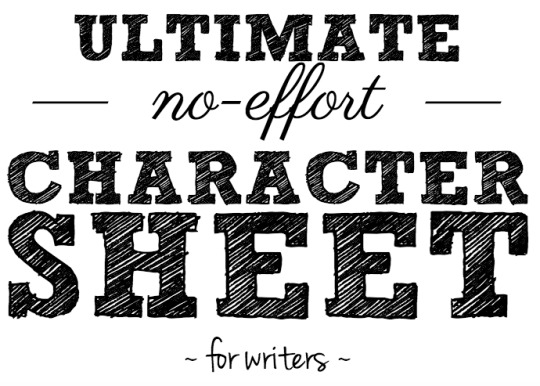

I’m a very lazy person. I know my characters well, but every time I try to fill out a proper character sheet, I either get distracted or simply never finish them.
SO!
I made this! A silly, simple character sheet in which you only have to check boxes to get to know your dear puppet character. Use to your heart’s content, and if you’re going to repost, please credit! Enjoy~
PDF/Printable version on Google Drive
60K notes
·
View notes
